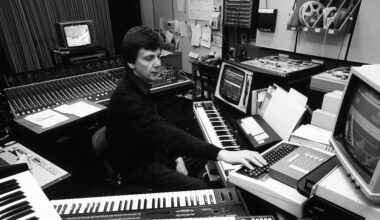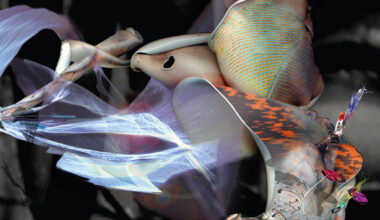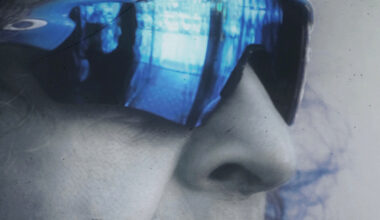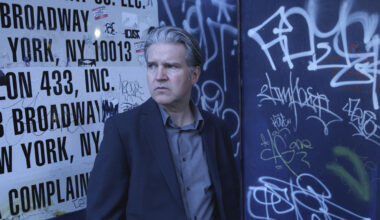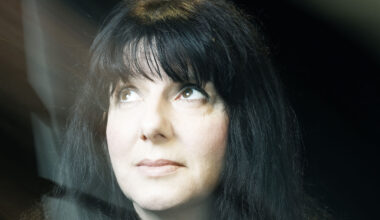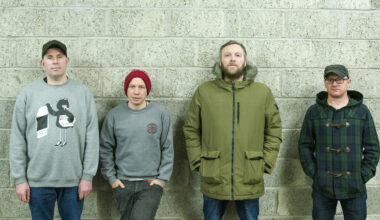With the album ‘A Steady Drip, Drip, Drip’, Sparks sound as essential as ever. What keeps them going after all these years? We talk Adam and Eve, Stravinsky, The Gettysburg Address and lawnmowers…
“You have to continually find ways that really stimulate you to do something that isn’t just rehashing what you’ve done,” says Russell Mael, the angel-voiced half of Sparks, reflecting on the band’s career, as they prepare to release their 24th album, ‘A Steady Drip, Drip, Drip’.
Sparks have been dependably present since 1967, with Russell and his songwriting brother Ron offering an utterly unique brand of erudite pop music, wrapped in a subversive absurdism that has seen them move effortlessly from glam scene-stealing to electronic innovating to artsy operatics, and all points in between.
With Ron’s knack for writing lyrics that traverse whimsy, with deep subject matter research and an awareness of the social issues of the day, Sparks have perpetually evaded easy classification, occupying a niche all of their own.
“Each time you start an album,” says Russell, “you want to find a fresh context for those distinctive Sparks elements that are always going to be there – my vocals, Ron’s lyrical slant and our personalities. But we don’t want to feel that we’re just going through the motions and getting lazy. We’re always battling to achieve something that never loses the idiosyncrasies of Sparks. You want someone with no knowledge of us to listen to our new album and feel like it’s from a band without a history.”
While the Mael brothers don’t want to lean into the nostalgia of their 50-year innings, ‘A Steady Drip, Drip, Drip’, like its 2017 predecessor ‘Hippopotamus’, or 2015’s inspired collaboration with Franz Ferdinand as FFS, finds Sparks in a resolutely pop frame of mind.
There was a time, a few years ago, when the idea of a Sparks album containing pop numbers was furthest from their minds. The project prior to FFS, ‘The Seduction Of Ingmar Bergman’, was an expansive radio musical about the Swedish auteur that highlighted both Ron’s mastery of adaptable songwriting and Russell’s distinctive falsetto. It was, however, some distance from ‘This Town Ain’t Big Enough For The Both Of Us’, ‘Beat The Clock’, ‘The Number One Song In Heaven’ or any of the countless brilliant records the pair have released over the years.
‘Hippopotamus’ and now ‘A Steady Drip, Drip, Drip’ are, in their own way, a release from a project that has been underway for over five years. Starring Marion Cotillard and Adam Driver, ‘Annette’ is a musical film project that will, when it finally reaches the silver screen later this year, represent perhaps the biggest, boldest Sparks endeavour in a career of such endeavours.
“There came a stretch where contracts had to be resolved and all this very boring stuff needed to be done,” explains Ron. “We also felt, just in a musical sense, a need to return to working within a more traditional song format of between three and four minutes. We love working in a long narrative way, and it’s really exciting, but our hearts have always been in pop music.”
It’s refreshing to hear Ron talk so affectionately, in his warm, engaging and slightly laconic way, about their music. Somewhere along the line, pop became an ugly word, a shorthand for throwaway chart fodder, and it’s no surprise that artists like the Mael brothers would want to kick against the genre. There’s an unfair expectation that such acts need to deliver more “mature” projects after racking up 20-odd albums, which is an idea that completely undermines what a group like Sparks have achieved.
“We feel fortunate at this point in such a long career that we can do this kind of music sincerely without it looking like we’re slumming it,” continues Ron. “This isn’t us going, ‘Oh, we’re real musicians and we’ll show that we can still do it’. It’s much more a part of what we really love, musically. Russell and I always get mad when pop music is violated by people either not caring for it, or not taking it seriously enough. It’s as valid a genre of music as any other. For us to do something more introspective, or mellow, or where we look back and re-evaluate the years – that wouldn’t be honest if it were coming from us.”
Not for nothing does ‘Self-Effacing’, the first single from the album, contain the lyric “My DNA just won’t go away”.

Between the pair, there’s enough vocal and musical dexterity to be able to deliver the songs on ‘A Steady Drip, Drip, Drip’ as a discrete unit. A consistent part of Sparks’ writing process has been the inclusion of other musicians to round out Ron’s vision. Like ‘Hippopotamus’, the new record features drummer Steven Nistor, a highly adaptable sticksman, who imbues the tracks with everything from jazzy swing to robotic pulses, while the sessions also featured two guitarists, Evan Weiss and Eli Pearl, alongside bass player Patrick Kelly.
“They’re young guys coming at it with a fresh spirit,” says Russell. “We basically sketch out everything and Ron plays pretty much all of the initial parts. We already know when it’s played by one of our guitarists that it’s going to sound a lot more dynamic, and so towards the end of the process we’ll bring in the other guys and say, ‘Here’s what we did – what can you do?’ and then they do a better version.”
Maybe it’s the characteristically intimidating 1,000-yard stare from countless promotional pictures, but Ron Mael doesn’t strike you as a very accommodating collaborator. Like so many things about this band, that turns out to be completely wrong too.
“If someone does come up with something better, even if it isn’t exactly like the original, that’s fine,” he offers. “It’s just important for us to have a starting point and to know if it was to be reproduced on real instruments, it would work within the context of the song.”
Despite an expansive back catalogue, which suggests a certain ease in Ron’s ability to knock out songs on a whim, he is sanguine.
“It’s a real messy process,” he laughs. “There are those occasional moments that you cherish, where an idea does come to you fully-formed, but it usually has to be squeezed from us nowadays, so it is more work in a certain way.”
But hold that thought. ‘A Steady Drip, Drip, Drip’ contains 14 songs, ‘Hippopotamus’ had 15, while the self-titled FFS album was 16. If this is Ron having to force out ideas, one wonders how prolific he would be if it did indeed come naturally.
Despite a definite modernity, ‘A Steady Drip, Drip, Drip’ feels like a collection of classic Sparks reference points. Alongside Russell’s inimitable vocal, there are big, boisterous guitars and drums on songs like ‘I’m Toast’ or ‘Self-Effacing’, providing an echo of their earliest material. Elsewhere, there are whispers of the pulsing, high-energy electronics that coloured their time working with Giorgio Moroder, all set alongside complicated arrangements that showcase their ambition to keep things fresh.
In fact, the here and now is everywhere on this record, particularly in Ron’s lyrics. On the desperate cry for help that is ‘I’m Toast’, Russell pleads with an Amazon Alexa to help him to escape his perilous position – a wry reflection of our faith in technology over religion – while ‘iPhone’ is probably the best example of Ron’s ability to reflect on the issues of the day.
With its stentorian chorus of “Put your fucking iPhone down and listen to me”, Russell might be singing about the daily challenge of those with screen-loving teenagers, but it’s much bigger than that. The verses document two events of historical and religious importance – the meeting of Adam and Eve, and Abraham Lincoln’s Gettysburg Address – and ponders what they’d have been like if Apple’s ubiquitous device had been present.
“Well, you don’t want to come off as some sort of cranky oldster,” explains Russell. “So it was important to find a way to frame it so it wasn’t just ranting. It seemed like the idea of an iPhone being a distraction throughout the entire history of mankind, would be a way to deflect it from just being a grumpy letter to the editor of some newspaper.”
‘A Steady Drip, Drip, Drip’ begins in a curious place with its opening track, ‘All That’. Steeped in lush arrangements and stirring atmospherics, it finds Russell’s wistful vocal coming across like the very reflectiveness they were trying to avoid. “All that we’ve done / We’ve lost, we’ve won” runs the chorus against a backdrop of mournful strings and a general sense of contemplation.
“It sets the tone in a certain way,” says Ron, “and then the rug is pulled out from under you by the time you get to ‘I’m Toast’, or even ‘Lawnmower’.”
Ah yes. ‘Lawnmower’. A brilliant, catchy, electronic powerhouse, it documents a protagonist’s over-attachment to his garden equipment and immaculate lawn, all of which threatens his relationship with his girlfriend.
Delivered as a rhyme, ‘Lawnmower’ is outwardly a simple, almost kids TV-friendly slice of nonsense, but its underlying theme of object fetishisation over human interaction is a classic Ron Mael trick.
“There’s a lot going on with the narrator of the song,” he offers, before explaining that its lyrics only emerged because of the repetitive nature of the demo he’d written, reminding him of the back-and-forth motion of a mower.
Another Sparks staple is the lack of an obvious, easy to decode meaning. ‘A Steady Drip, Drip, Drip’ has plenty of such moments, but perhaps the best example is ‘Sainthood Is Not In Your Future’, where the lyrics seem to either describe the worst type of aspiring celebrity, or a Machiavellian politician, or maybe neither.
“We like the listener to come up with their own interpretation,” says Russell. “It could be a relationship that someone’s going through, or it could be things going on in the world. It doesn’t necessarily have to be directed at one specific person or concept. We like leaving it vague, where it’s not completely spelled out, so that there’s an ambiguity as to what we, maybe, had in mind.”
‘Stravinsky’s Only Hit’ is among the most operatic pieces on the album, and finds Ron daydreaming about composer Igor Stravinsky writing a hit single. It’s bonkers and is delivered as a rambunctious, dramatic piece full of heavy strings and melodic motifs.
“I was taking something that was never there – Stravinsky’s only hit – and going into such detail about the impact of that, especially on Stravinsky himself,” says Ron. “It explains how it led him down the path of debauchery for a while, before he drifted back into his true calling, which is of course being Igor Stravinsky.”
“I love the absurdity of referring to hits when you’re talking about Stravinsky,” adds Russell. “I also really like that Ron came up with that fantasy-like thing which goes into real specificity about a subject and a topic that didn’t ever happen.”
Within the alternative universe story Ron tells, there’s also a reference to music industry people advising a figure like Stravinsky what to do in order to gain a wider audience. Record company intervention is all too common, but is it something Sparks have ever experienced?
“Luckily, we’ve been independent throughout our whole career,” explains Ron. “The only time we’ve had any oversight of what we were doing was by producers who we really, really respected. So whether it was with Muff Winwood, or Giorgio Moroder, or Tony Visconti, people who were maybe more demanding, they saw some songs that were stronger versus those they felt weren’t.
“But even in those cases, people know what they’re getting themselves into with us, and so there’s quite a bit of acceptance of what we are, and even encouragement. Right from the very beginning with Todd Rundgren, he was incredibly generous as far as allowing us to pursue our eccentricities, and so we were just really fortunate in that way.
“In recent years, we haven’t used a producer, but I like to think that we’ve taken some of the lessons we learned from Muff and Giorgio and Tony, and we try to step back and look at things a little more objectively. ‘Is this actually something great, or do we just like it because it’s what we did?’. I think we’ve got better in that sense, in that we do reject things we don’t feel are quite up to the level they could be.”
‘A Steady Drip, Drip, Drip’ ends with the plaintive ‘Please Don’t Fuck Up My World’, another track with an inherent sense of ambiguity. On the one hand, the song recalls 1974’s ‘Never Turn Your Back On Mother Earth’, only with a more direct, visceral message designed for the Thunberg generation, and – just to illustrate the point further – delivered by a choir of children. On the other hand, Russell explains that it could also be about a relationship “Where you’re pleading with them, for whatever reason, to not fuck up your world”.
While it might have a cautionary tone, something about the delivery – split between a first half dominated by Russell’s voice, and the second half by the Coldwater Canyon Youth Choir – is hopeful, optimistic even.
“I like that we’re deferring to younger people to give you the kick in the butt to get it together,” says Ron. “Time is running out, and I think it gets even more relevant with the recent developments around the world. Perhaps it has even more resonance at the moment.”
It feels like the world needs the Maels’ music right now; their unique look at what’s going on around us, their irreverence, their distinctive humour and their quintessential, timeless, indomitable Sparksness.
‘A Steady Drip. Drip, Drip’ is on BMG

